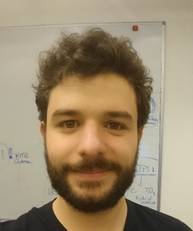
1. What motivated you to join the DS Board?
My name is Giulio Calcagno and I am a doctoral student at Applied Surface Chemistry, Department of Chemistry. I am from Italy, and to be more precise from Sicily – a beautiful and sunny island. After my studies in Milan, I decided to go up north and experience the Scandinavian way; and, that’s why I am here at Chalmers. My research focuses on the materials and chemistry behind electrical energy storage solutions, specifically hybrid supercapacitors. The aim of my Ph.D. project is to develop efficient and sustainable alternatives to lithium-ion batteries.
2. What motivated you to join the DS Board?
I have always been attracted by the idea of “fighting for rights and development”. I believe in taking initiatives to improve my living conditions, and the DS Board seemed (and it actually is) the right place to start regarding Chalmers.
3. What do you think has been the most interesting and surprising aspect of being DS Boardie?
The power of working in a group of people with different experiences, but shared goals. The members of the Board come from all the department of Chalmers, so they all have different backgrounds. Can you imagine how inspiring can it be to work and discuss with 21 Ph.D. students from all the field of technology?
3. Do you, as a DS Chair, have any specific plans for the year 2018-2019?
First thing is to make sure that all the projects and work of previous years are continuing; thus; changes usually take much more time than expected, so it is important to continue the decisions taken in the previous years. One of the main aims of this year is to raise the awareness of Chalmers management to the Ph.D. students’ issues; I believe Ph.D. students deserve more ability to influence decisions, being us one-third of the workforce of Chalmers. Also, the focus must be put on improving the rules of procedure, supervision and follow up, so that the licentiate/doctoral degrees can be reached in the planned times.
4. What do you take back after being a DS Boardie?
That problems must be tackled from different perspectives, and perseverance. Universities are big entities with many different ways of doing things; and, in case of Board like DS, one can make the difference to find a common path.
5. What do you like to do when you are not researching?
I love spending time with my friends, meeting new people and good music. I like to travel and experience new things whenever I can. Just came back from Rome – all of you should go there and eat a good “Carbonara”!
6. How do you handle stress at work (mainly from research)? Does it affect your personal life? How do you overcome this?
I always try to find time to do small relaxing things. It can be a chat with a colleague, a few songs and a cup of coffee, a nice walk/run, cleaning home (yes it works really good!). But mostly talking to friends and people you trust helps a lot; most of the time problems are much less heavy when you share them with someone else. It can be really cathartic.
7. Do you think your time at DS board will help you to develop your skills (i.e. leadership skills) which will be helpful for your professional career? How?
Definitely! During my time in DS I have worked a lot on how to effectively communicate with people irrespective of topics. It is more complicated to find compromises and convince people about your point when you don´t have data by your side. Being a leader is not easy, but DS is definitely helping in understanding what type of leader I would like to be. The best part is that I am improving in time management, and it is already giving me benefits in work and private life.
8. What is the best advice/feedback you have received you think helped you a lot in your career/personal life?
There is no unique concept of “normal”. Everything (behaviors, rules, expectations…) is contingent to the situation. When you accept that, you can then focus on how to be flexible with the context and vice versa – adapt the context to yourself. Life becomes much easier and rewarding.